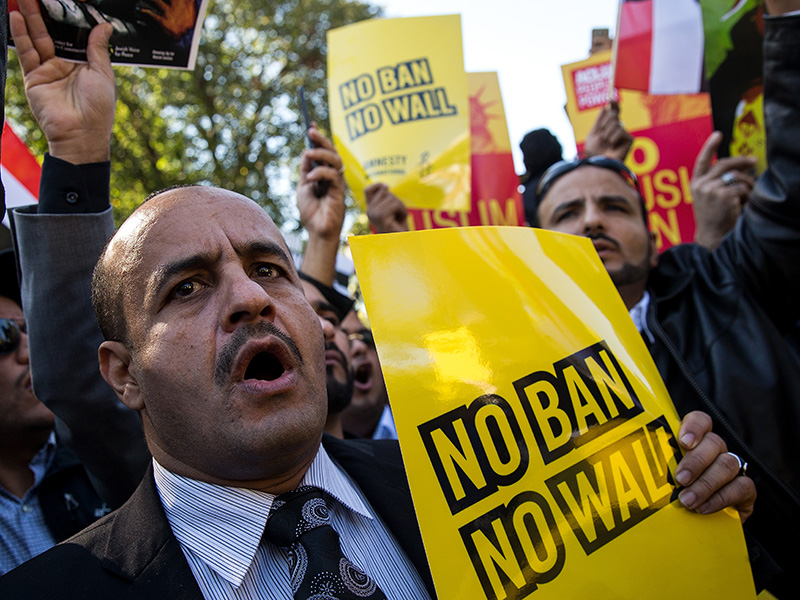As Travel Ban Goes Into Effect, Federal Courts Hear Appeals
By Gabe Cahn, HIAS.org
Dec 08, 2017

Activists rally in Lafayette Park during a protest against the Trump administration's proposed travel ban, October 18, 2017 in Washington, D.C.
(Drew Angerer/Getty Images)
On Monday, December 4, the United States Supreme Court stayed two lower court decisions which for the past six weeks had blocked the Trump Administration from implementing its latest travel ban. As a result, the U.S. Department of State announced today that the ban has been “fully implemented.”
The Presidential Proclamation in question indefinitely prohibits travelers who are citizens of eight countries—Syria, Libya, Iran, Yemen, Chad and Somalia, North Korea and Venezuela—from entering the United States. In October, U.S. district courts in Hawaii and Maryland issued preliminary injunctions preventing the government from banning travelers from the six Muslim-majority countries listed above, which account for approximately 150 million people.
Though the Supreme Court did not provide reasoning for their decision or weigh in on the merits of the respective cases, the justices indicated that the U.S. court of appeals should hear Trump v. Hawaii and Trump v. International Refugee Assistance Project without delay.
Accordingly, today in Richmond, Virginia, the United States Court of Appeals for the Fourth Circuit listened to oral arguments in Trump v. International Refugee Assistance Project, a case in which HIAS is a plaintiff, to determine the legality of the proclamation.
Yesterday marked 2 years since candidate Trump called for a "total and complete shutdown" of Muslims entering the U.S.
Today we're back in court with our friends at @RefugeeAssist @NILC_org @ACLU and others to say #NoMuslimBanEver
Listen in: https://t.co/SJVXapsDXK
— HIAS (@HIASrefugees) December 8, 2017
In addition to drawing out the significance, or lack thereof, of Monday’s Supreme Court order, the 13 judges spent a good portion of the two hours dealing “with how to square Trump's tweets with the administration's insistence that the president's third attempt at a travel ban wasn't rooted in anti-Muslim bias,” as Buzzfeed’s Zoe Tillman reports.
"Do we just ignore reality and look at the legality to determine how to handle this case?” Judge James Wynn Jr. asked Deputy Assistant Attorney General Hashim Mooppan.
Mooppan contended that while the tweets are in fact official White House statements, they should not be considered “legally relevant.”
Cecillia Wang, deputy legal director for the ACLU, argued on behalf of the organizations and individuals challenging the travel ban.
The Washington Post’s Ann E. Marimow points out that Wang faced the toughest line of questioning from Judges Paul Niemeyer and Steven Agee, who “aggressively pressed” her about “why the court shouldn’t defer to the president’s broad authority when it comes to national security and immigration.”
“Where do we get the right to review the president’s foreign policy decision?” Judge Niemeyer asked her.
Judges ask what is the standing to bring these claims. Courts have authority to enjoin an executive action if it violates the Constitution or statute. And countless cases uphold this. There's an equitable power to do this. #NoMuslimBanEver
— National Immigration Law Center (@NILC_org) December 8, 2017
The arguments in Fourth Circuit took place just two days after a three-judge panel of the Ninth Circuit heard the Hawaii case in Seattle.
Judges Ronald Gould, Richard Paez and Michael Hawkins also focused their questioning on whether the latest iteration of the travel ban was simply another Muslim ban or a more legitimate national security directive.
The court asked why we call it a Muslim ban when some Muslim-majority countries aren’t included.
The answer: Trump has assured us since he was first campaigning that he wants to ban Muslims, and it affects millions of people in countries that are 95% Muslim.
#NoMuslimBanEVER— ACLU (@ACLU) December 8, 2017
Specifically, the judges attempted to ascertain if the administration had truly demonstrated that admitting nationals of the six countries would be a detriment to U.S. interests.
Gene Johnson of the Associated Press wrote that while Mr. Mooppan contended that “you might disagree with the finding, but you can’t disagree that the finding was made,” Neal Katyal, the former U.S. solicitor general representing Hawaii, insisted that the government "came back with zero.”
Rulings in each case are expected in the coming weeks. In the meantime, HIAS is preparing for oral arguments in JFS v. Trump, the case filed in Washington state last month challenging the latest refugee restrictions from October 24.
To listen to today’s oral arguments from the Fourth Circuit, click here, and to watch the arguments from Wednesday in the Ninth Circuit in Seattle, click here. As always, follow HIAS on Facebook, Twitter and Instagram for updates on litigation against the Muslim and refugee bans.



